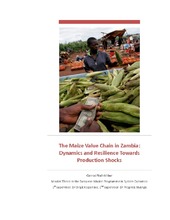The Maize Value Chain in Zambia: Dynamics and Resilience Towards Production Shocks
Master thesis
Permanent lenke
https://hdl.handle.net/1956/11618Utgivelsesdato
2015-07-03Metadata
Vis full innførselSamlinger
- Department of Geography [676]
Sammendrag
Zambia is a country whose food security largely depends on maize. In the light of expected structural maize deficits and the likely occurrence of shock events, the aim of this thesis is to test the resilience of the Zambian maize value chain towards production shocks in terms of food supply security, and to find policy recommendations on how to increase this resilience. To that end, I devised and applied a new framework for measuring resilience properties using System Dynamics, which relies on comparing the development of food security indicators between the base run and the respective shock scenario run of a simulation model. Results show that the value chain is quite resilient towards floods and exchange rate shocks, moderately vulnerable towards changes in fertilizer subsidy programmes, and very vulnerable towards droughts, especially prolonged ones. In general, the resilience of the value chain towards one-time shocks is good due to the existence of maize buffer stocks that people can consume when production is low. However, the value chain is not very resilient if faced with two or more different shocks, as buffer stocks are quickly depleted and maize demand cannot be serviced any more. The resilience properties are also strongly affected by demand adjustments of consumers in response to changing maize availability, and moderately affected by the distribution of maize in between the informal and formal value chain and the storage policies of FRA. The observed resilience properties can endogenously be improved using smart long-term maize storage policies that exploit surplus production years.
